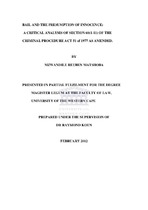| dc.description.abstract | In South Africa, as in most jurisdictions, the presumption of innocence is a guaranteed constitutional right. The rationale of the presumption lies in the protection which it offers, since a person charged with a criminal offence stands to lose dearly in personal liberty, in social life and psychological well-being. The presumption is, therefore, a pivotal element of a culture of democracy and human rights. This study is prompted by the realisation that the presumption of innocence, which ought to constitute one of the most fundamental rights in any criminal justice system, is being eroded steadily in South Africa. In this regard, a significant area of concern is the current bail laws which, in my estimation, make a big dent into the right to be presumed innocent. The bail laws are part of government’s policies directed at fighting crime. However, the pre-occupation with crime control measures threatens to reverse the hard-won rights of the accused and threatens to undermine individual liberty. Also, these measures are incompatible with the constitutional commitment to a culture of human rights. | en_US |

